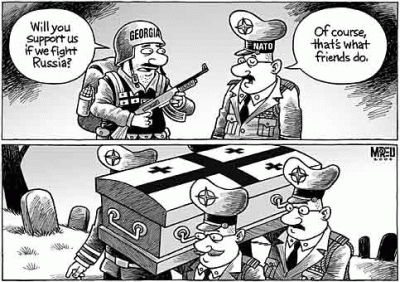
There’s an expression that goes something like, “Just because you’re paranoid doesn’t mean they’re not out to get you.”
Such is the view of O Globo of Brazil’s chief foreign columnist, William Waack, in regard to Russia and its recent behavior.
“To those who weren’t in Moscow in the moments that followed the implosion of the Soviet Empire, it’s difficult to convey the depth of humiliation that Russians felt. A good part of the public reaction to the political reordering of the country is tied to the fact that the expansion of the Empire wasn’t just a victory for the Bolsheviks [seized power in the 1917 Revolution ] – and here I directly address the tendency toward strong-arm politicians like Vladimir Putin. Historians generally agree that this was a continuation.
“But It isn’t because of the communist era – or Stalinist paranoia – that Russians think they’re being surrounded by the West or dismissed by Western capitals – or both. … I’m taking care here not to fall into the rather simplistic argument that Russia’s stance on the separatist provinces and Georgia itself is a ‘justified’ reaction by Moscow to the way the West has treated it … And the way the United States went to war in the Middle East; or the way that the major Western countries have recognized the independence of Kosovo from Serbia, a former client of Moscow. After all, to explain a behavior (in this case, of the Russians) is not to support it.”
By William Waack
Translated By Brandi Miller
August 11, 2008
Brazil – O Globo – Original Article (Portuguese)
The return of the Russian bear is a melancholic film. In Moscow, two political factors of great magnitude combine regarding Ossetia-Abkhazia-Georgia: wounded pride for a lost empire and the wish to reorganize nearby regions (the “near abroad,” as the Russians say). Is it possible that these two elements, which one would consider “psychological” and “emotional,” explain the behavior of sovereign states? Yes, they do.
To those who weren’t in Moscow in the moments that followed the implosion of the Soviet Empire, it’s difficult to convey the depth of humiliation that Russians felt. A good part of the public reaction to the political reordering of the country is tied to the fact that the expansion of the Empire wasn’t just a victory for the Bolsheviks [seized power in the 1917 Revolution ] – and here I directly address the tendency toward strong-arm politicians like Vladimir Putin. Historians generally agree that this was a continuation.
But it isn’t because of the communist era – or Stalinist paranoia – that Russians think they’re being surrounded by the West or dismissed by Western capitals or both. The way they see the world, there is no shortage of examples. The way NATO expanded its boundaries to the edge of Russia, for example, perfectly served the security needs of the States that are today part of the new Central Europe.
READ ON AT WORLDMEETS.US, along with continuing translated foreign press coverage of the unfolding crisis in the Caucasus.
















